Essay on Law and Ethics in Nursing: Healthcare Regulations Analysis
VerifiedAdded on 2022/11/25
|12
|4055
|241
Essay
AI Summary
This essay delves into the critical intersection of law and ethics within the nursing profession, emphasizing the importance of ethical conduct and legal compliance in healthcare. It explores key ethical principles such as autonomy, non-maleficence, beneficence, and justice, and discusses their application in various medical scenarios. The essay examines relevant healthcare laws, including the Emergency Medical Treatment and Active Labor Act (EMTALA), the Stark Law, the anti-kickback statute, and the Health Information Technology for Economic and Clinical Health (HITECH) Act, highlighting their significance in protecting patient rights and ensuring quality care. Through case studies, the essay illustrates the ethical dilemmas healthcare professionals face and analyzes the potential conflicts between legal requirements and ethical considerations. The paper further discusses the role of weekly ethics sessions and committees in the UK to address ethical issues and promote best practices, aiming to improve patient care and uphold ethical standards within the healthcare system. The essay concludes by emphasizing the ongoing need for vigilance and continuous improvement in the realm of law and ethics to safeguard patient well-being and maintain the integrity of the nursing profession.
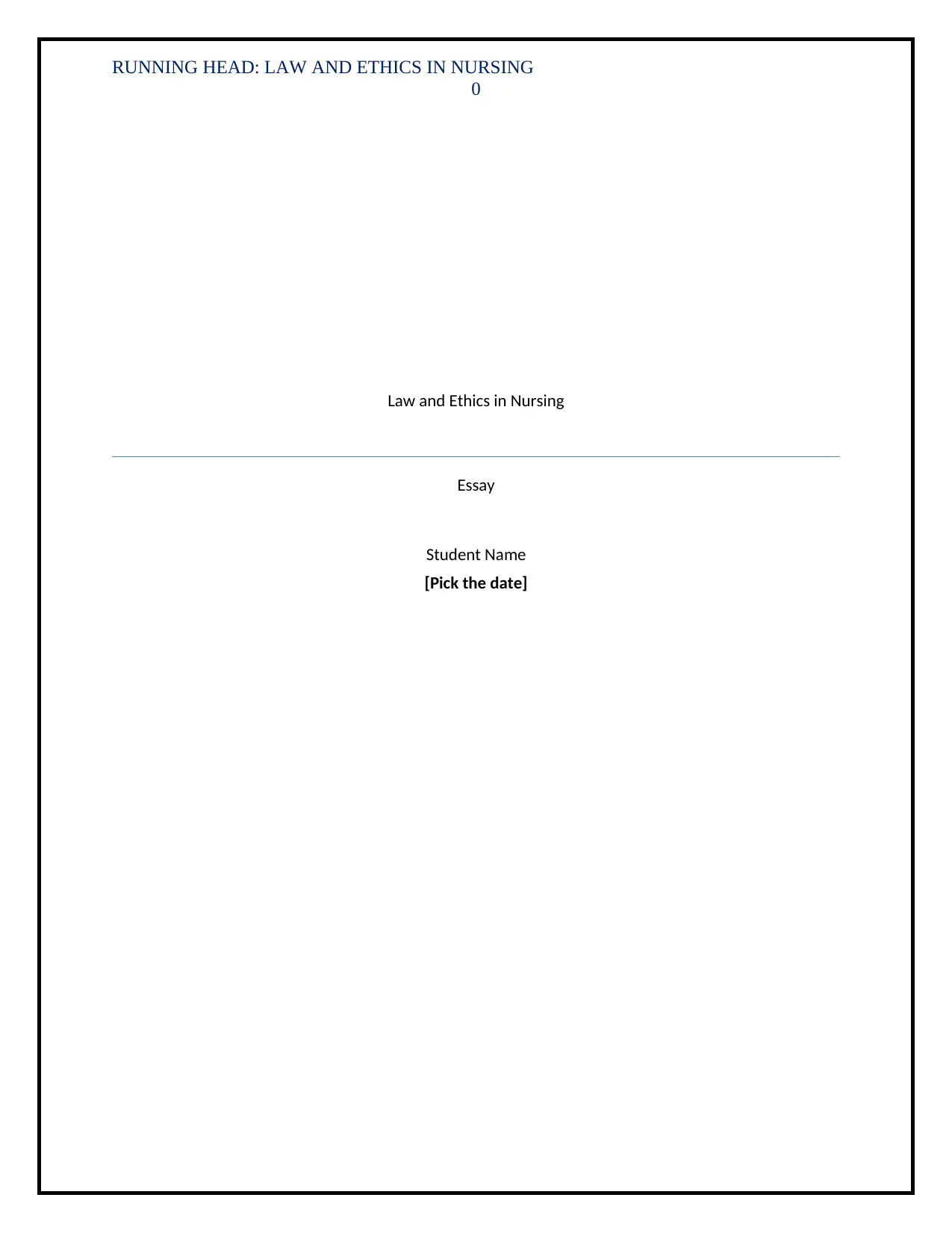
RUNNING HEAD: LAW AND ETHICS IN NURSING
0
Law and Ethics in Nursing
Essay
Student Name
[Pick the date]
0
Law and Ethics in Nursing
Essay
Student Name
[Pick the date]
Paraphrase This Document
Need a fresh take? Get an instant paraphrase of this document with our AI Paraphraser
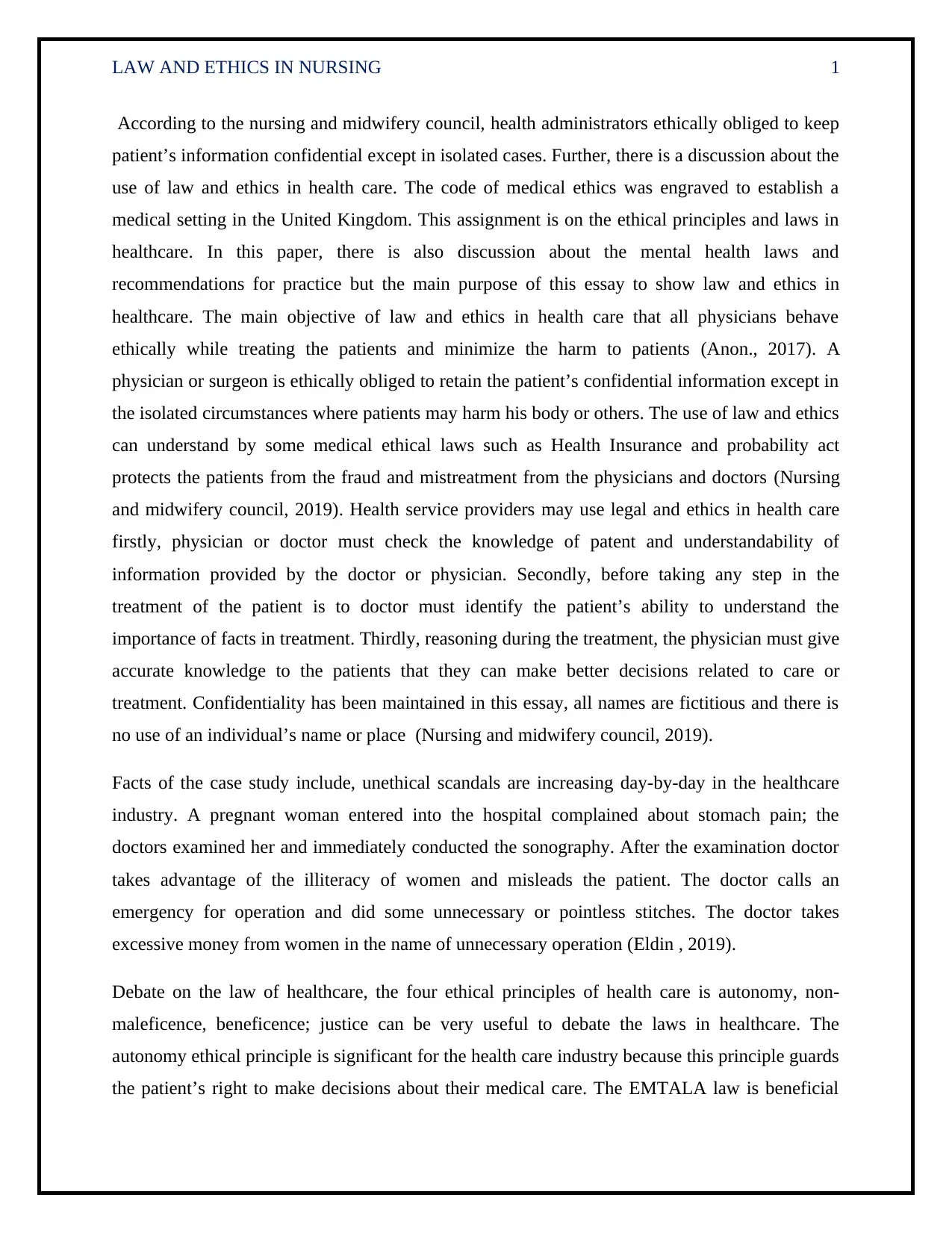
LAW AND ETHICS IN NURSING 1
According to the nursing and midwifery council, health administrators ethically obliged to keep
patient’s information confidential except in isolated cases. Further, there is a discussion about the
use of law and ethics in health care. The code of medical ethics was engraved to establish a
medical setting in the United Kingdom. This assignment is on the ethical principles and laws in
healthcare. In this paper, there is also discussion about the mental health laws and
recommendations for practice but the main purpose of this essay to show law and ethics in
healthcare. The main objective of law and ethics in health care that all physicians behave
ethically while treating the patients and minimize the harm to patients (Anon., 2017). A
physician or surgeon is ethically obliged to retain the patient’s confidential information except in
the isolated circumstances where patients may harm his body or others. The use of law and ethics
can understand by some medical ethical laws such as Health Insurance and probability act
protects the patients from the fraud and mistreatment from the physicians and doctors (Nursing
and midwifery council, 2019). Health service providers may use legal and ethics in health care
firstly, physician or doctor must check the knowledge of patent and understandability of
information provided by the doctor or physician. Secondly, before taking any step in the
treatment of the patient is to doctor must identify the patient’s ability to understand the
importance of facts in treatment. Thirdly, reasoning during the treatment, the physician must give
accurate knowledge to the patients that they can make better decisions related to care or
treatment. Confidentiality has been maintained in this essay, all names are fictitious and there is
no use of an individual’s name or place (Nursing and midwifery council, 2019).
Facts of the case study include, unethical scandals are increasing day-by-day in the healthcare
industry. A pregnant woman entered into the hospital complained about stomach pain; the
doctors examined her and immediately conducted the sonography. After the examination doctor
takes advantage of the illiteracy of women and misleads the patient. The doctor calls an
emergency for operation and did some unnecessary or pointless stitches. The doctor takes
excessive money from women in the name of unnecessary operation (Eldin , 2019).
Debate on the law of healthcare, the four ethical principles of health care is autonomy, non-
maleficence, beneficence; justice can be very useful to debate the laws in healthcare. The
autonomy ethical principle is significant for the health care industry because this principle guards
the patient’s right to make decisions about their medical care. The EMTALA law is beneficial
According to the nursing and midwifery council, health administrators ethically obliged to keep
patient’s information confidential except in isolated cases. Further, there is a discussion about the
use of law and ethics in health care. The code of medical ethics was engraved to establish a
medical setting in the United Kingdom. This assignment is on the ethical principles and laws in
healthcare. In this paper, there is also discussion about the mental health laws and
recommendations for practice but the main purpose of this essay to show law and ethics in
healthcare. The main objective of law and ethics in health care that all physicians behave
ethically while treating the patients and minimize the harm to patients (Anon., 2017). A
physician or surgeon is ethically obliged to retain the patient’s confidential information except in
the isolated circumstances where patients may harm his body or others. The use of law and ethics
can understand by some medical ethical laws such as Health Insurance and probability act
protects the patients from the fraud and mistreatment from the physicians and doctors (Nursing
and midwifery council, 2019). Health service providers may use legal and ethics in health care
firstly, physician or doctor must check the knowledge of patent and understandability of
information provided by the doctor or physician. Secondly, before taking any step in the
treatment of the patient is to doctor must identify the patient’s ability to understand the
importance of facts in treatment. Thirdly, reasoning during the treatment, the physician must give
accurate knowledge to the patients that they can make better decisions related to care or
treatment. Confidentiality has been maintained in this essay, all names are fictitious and there is
no use of an individual’s name or place (Nursing and midwifery council, 2019).
Facts of the case study include, unethical scandals are increasing day-by-day in the healthcare
industry. A pregnant woman entered into the hospital complained about stomach pain; the
doctors examined her and immediately conducted the sonography. After the examination doctor
takes advantage of the illiteracy of women and misleads the patient. The doctor calls an
emergency for operation and did some unnecessary or pointless stitches. The doctor takes
excessive money from women in the name of unnecessary operation (Eldin , 2019).
Debate on the law of healthcare, the four ethical principles of health care is autonomy, non-
maleficence, beneficence; justice can be very useful to debate the laws in healthcare. The
autonomy ethical principle is significant for the health care industry because this principle guards
the patient’s right to make decisions about their medical care. The EMTALA law is beneficial
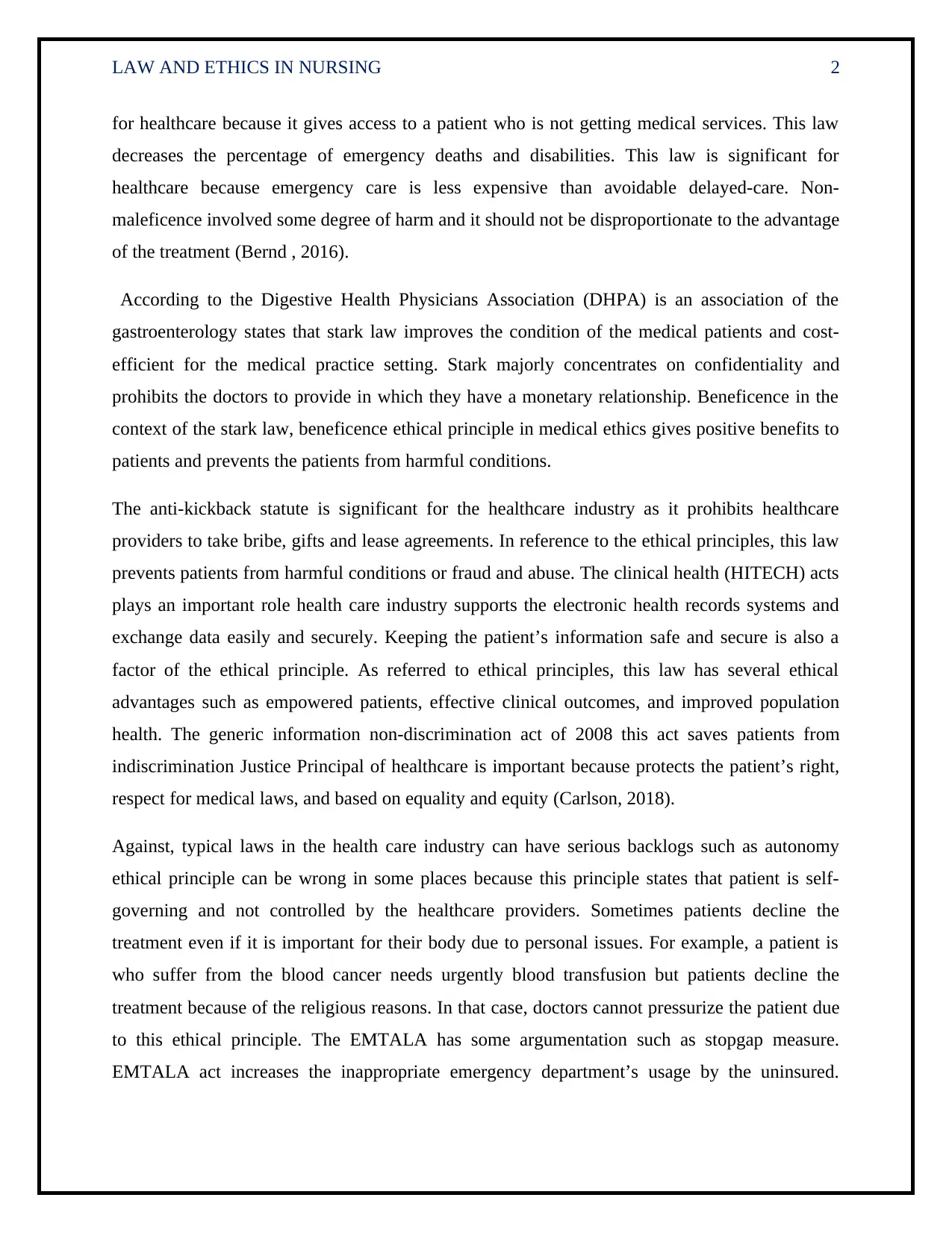
LAW AND ETHICS IN NURSING 2
for healthcare because it gives access to a patient who is not getting medical services. This law
decreases the percentage of emergency deaths and disabilities. This law is significant for
healthcare because emergency care is less expensive than avoidable delayed-care. Non-
maleficence involved some degree of harm and it should not be disproportionate to the advantage
of the treatment (Bernd , 2016).
According to the Digestive Health Physicians Association (DHPA) is an association of the
gastroenterology states that stark law improves the condition of the medical patients and cost-
efficient for the medical practice setting. Stark majorly concentrates on confidentiality and
prohibits the doctors to provide in which they have a monetary relationship. Beneficence in the
context of the stark law, beneficence ethical principle in medical ethics gives positive benefits to
patients and prevents the patients from harmful conditions.
The anti-kickback statute is significant for the healthcare industry as it prohibits healthcare
providers to take bribe, gifts and lease agreements. In reference to the ethical principles, this law
prevents patients from harmful conditions or fraud and abuse. The clinical health (HITECH) acts
plays an important role health care industry supports the electronic health records systems and
exchange data easily and securely. Keeping the patient’s information safe and secure is also a
factor of the ethical principle. As referred to ethical principles, this law has several ethical
advantages such as empowered patients, effective clinical outcomes, and improved population
health. The generic information non-discrimination act of 2008 this act saves patients from
indiscrimination Justice Principal of healthcare is important because protects the patient’s right,
respect for medical laws, and based on equality and equity (Carlson, 2018).
Against, typical laws in the health care industry can have serious backlogs such as autonomy
ethical principle can be wrong in some places because this principle states that patient is self-
governing and not controlled by the healthcare providers. Sometimes patients decline the
treatment even if it is important for their body due to personal issues. For example, a patient is
who suffer from the blood cancer needs urgently blood transfusion but patients decline the
treatment because of the religious reasons. In that case, doctors cannot pressurize the patient due
to this ethical principle. The EMTALA has some argumentation such as stopgap measure.
EMTALA act increases the inappropriate emergency department’s usage by the uninsured.
for healthcare because it gives access to a patient who is not getting medical services. This law
decreases the percentage of emergency deaths and disabilities. This law is significant for
healthcare because emergency care is less expensive than avoidable delayed-care. Non-
maleficence involved some degree of harm and it should not be disproportionate to the advantage
of the treatment (Bernd , 2016).
According to the Digestive Health Physicians Association (DHPA) is an association of the
gastroenterology states that stark law improves the condition of the medical patients and cost-
efficient for the medical practice setting. Stark majorly concentrates on confidentiality and
prohibits the doctors to provide in which they have a monetary relationship. Beneficence in the
context of the stark law, beneficence ethical principle in medical ethics gives positive benefits to
patients and prevents the patients from harmful conditions.
The anti-kickback statute is significant for the healthcare industry as it prohibits healthcare
providers to take bribe, gifts and lease agreements. In reference to the ethical principles, this law
prevents patients from harmful conditions or fraud and abuse. The clinical health (HITECH) acts
plays an important role health care industry supports the electronic health records systems and
exchange data easily and securely. Keeping the patient’s information safe and secure is also a
factor of the ethical principle. As referred to ethical principles, this law has several ethical
advantages such as empowered patients, effective clinical outcomes, and improved population
health. The generic information non-discrimination act of 2008 this act saves patients from
indiscrimination Justice Principal of healthcare is important because protects the patient’s right,
respect for medical laws, and based on equality and equity (Carlson, 2018).
Against, typical laws in the health care industry can have serious backlogs such as autonomy
ethical principle can be wrong in some places because this principle states that patient is self-
governing and not controlled by the healthcare providers. Sometimes patients decline the
treatment even if it is important for their body due to personal issues. For example, a patient is
who suffer from the blood cancer needs urgently blood transfusion but patients decline the
treatment because of the religious reasons. In that case, doctors cannot pressurize the patient due
to this ethical principle. The EMTALA has some argumentation such as stopgap measure.
EMTALA act increases the inappropriate emergency department’s usage by the uninsured.
⊘ This is a preview!⊘
Do you want full access?
Subscribe today to unlock all pages.

Trusted by 1+ million students worldwide
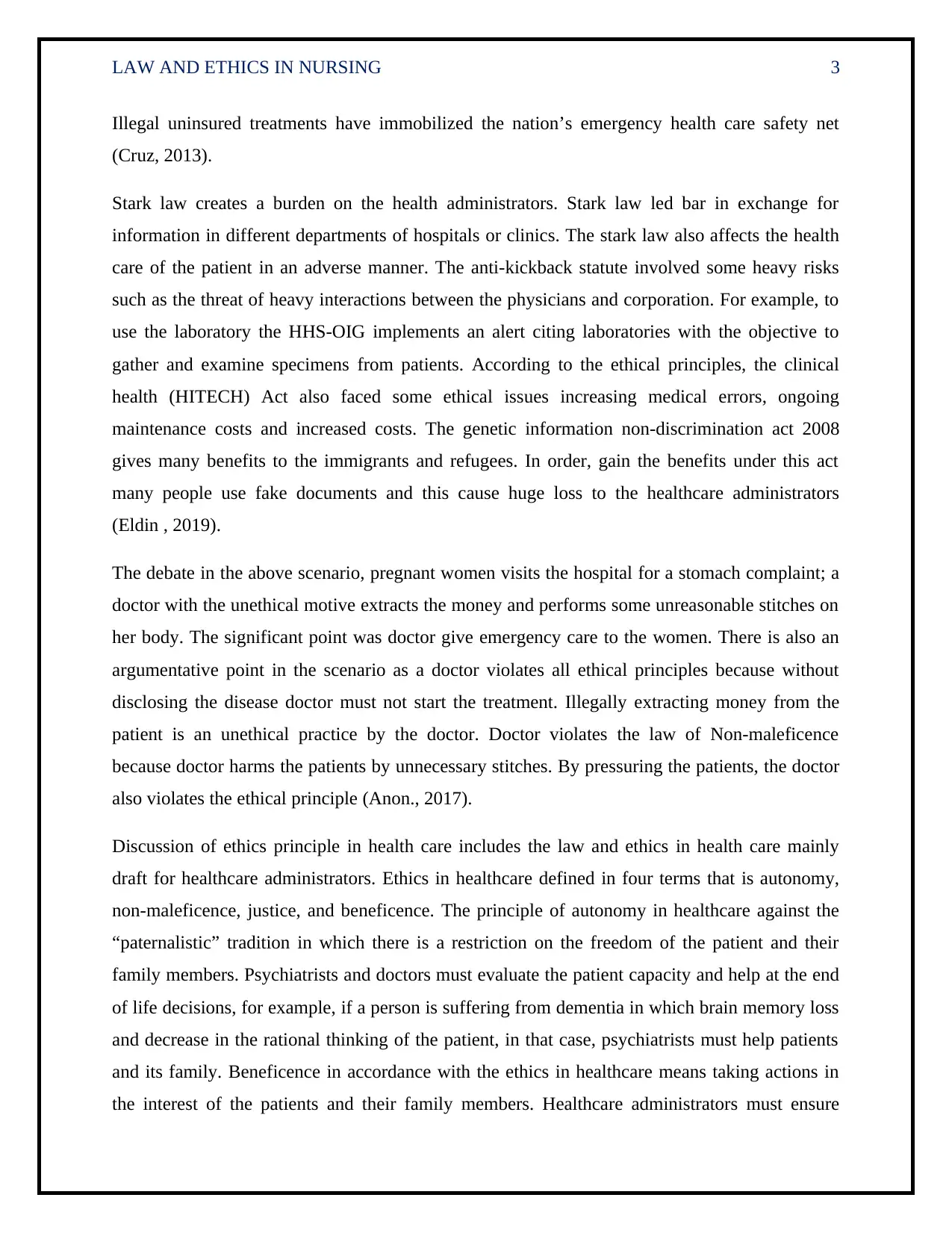
LAW AND ETHICS IN NURSING 3
Illegal uninsured treatments have immobilized the nation’s emergency health care safety net
(Cruz, 2013).
Stark law creates a burden on the health administrators. Stark law led bar in exchange for
information in different departments of hospitals or clinics. The stark law also affects the health
care of the patient in an adverse manner. The anti-kickback statute involved some heavy risks
such as the threat of heavy interactions between the physicians and corporation. For example, to
use the laboratory the HHS-OIG implements an alert citing laboratories with the objective to
gather and examine specimens from patients. According to the ethical principles, the clinical
health (HITECH) Act also faced some ethical issues increasing medical errors, ongoing
maintenance costs and increased costs. The genetic information non-discrimination act 2008
gives many benefits to the immigrants and refugees. In order, gain the benefits under this act
many people use fake documents and this cause huge loss to the healthcare administrators
(Eldin , 2019).
The debate in the above scenario, pregnant women visits the hospital for a stomach complaint; a
doctor with the unethical motive extracts the money and performs some unreasonable stitches on
her body. The significant point was doctor give emergency care to the women. There is also an
argumentative point in the scenario as a doctor violates all ethical principles because without
disclosing the disease doctor must not start the treatment. Illegally extracting money from the
patient is an unethical practice by the doctor. Doctor violates the law of Non-maleficence
because doctor harms the patients by unnecessary stitches. By pressuring the patients, the doctor
also violates the ethical principle (Anon., 2017).
Discussion of ethics principle in health care includes the law and ethics in health care mainly
draft for healthcare administrators. Ethics in healthcare defined in four terms that is autonomy,
non-maleficence, justice, and beneficence. The principle of autonomy in healthcare against the
“paternalistic” tradition in which there is a restriction on the freedom of the patient and their
family members. Psychiatrists and doctors must evaluate the patient capacity and help at the end
of life decisions, for example, if a person is suffering from dementia in which brain memory loss
and decrease in the rational thinking of the patient, in that case, psychiatrists must help patients
and its family. Beneficence in accordance with the ethics in healthcare means taking actions in
the interest of the patients and their family members. Healthcare administrators must ensure
Illegal uninsured treatments have immobilized the nation’s emergency health care safety net
(Cruz, 2013).
Stark law creates a burden on the health administrators. Stark law led bar in exchange for
information in different departments of hospitals or clinics. The stark law also affects the health
care of the patient in an adverse manner. The anti-kickback statute involved some heavy risks
such as the threat of heavy interactions between the physicians and corporation. For example, to
use the laboratory the HHS-OIG implements an alert citing laboratories with the objective to
gather and examine specimens from patients. According to the ethical principles, the clinical
health (HITECH) Act also faced some ethical issues increasing medical errors, ongoing
maintenance costs and increased costs. The genetic information non-discrimination act 2008
gives many benefits to the immigrants and refugees. In order, gain the benefits under this act
many people use fake documents and this cause huge loss to the healthcare administrators
(Eldin , 2019).
The debate in the above scenario, pregnant women visits the hospital for a stomach complaint; a
doctor with the unethical motive extracts the money and performs some unreasonable stitches on
her body. The significant point was doctor give emergency care to the women. There is also an
argumentative point in the scenario as a doctor violates all ethical principles because without
disclosing the disease doctor must not start the treatment. Illegally extracting money from the
patient is an unethical practice by the doctor. Doctor violates the law of Non-maleficence
because doctor harms the patients by unnecessary stitches. By pressuring the patients, the doctor
also violates the ethical principle (Anon., 2017).
Discussion of ethics principle in health care includes the law and ethics in health care mainly
draft for healthcare administrators. Ethics in healthcare defined in four terms that is autonomy,
non-maleficence, justice, and beneficence. The principle of autonomy in healthcare against the
“paternalistic” tradition in which there is a restriction on the freedom of the patient and their
family members. Psychiatrists and doctors must evaluate the patient capacity and help at the end
of life decisions, for example, if a person is suffering from dementia in which brain memory loss
and decrease in the rational thinking of the patient, in that case, psychiatrists must help patients
and its family. Beneficence in accordance with the ethics in healthcare means taking actions in
the interest of the patients and their family members. Healthcare administrators must ensure
Paraphrase This Document
Need a fresh take? Get an instant paraphrase of this document with our AI Paraphraser
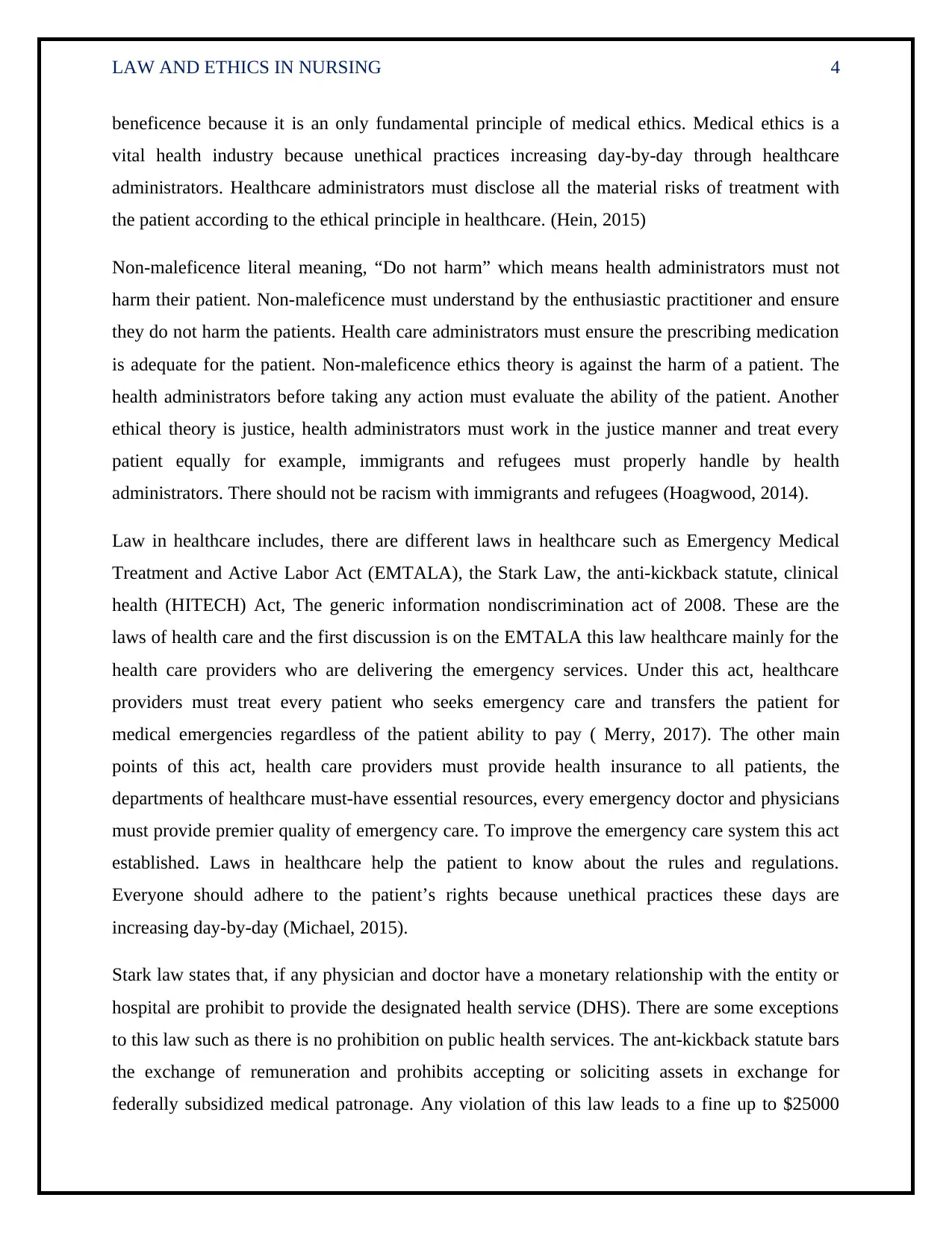
LAW AND ETHICS IN NURSING 4
beneficence because it is an only fundamental principle of medical ethics. Medical ethics is a
vital health industry because unethical practices increasing day-by-day through healthcare
administrators. Healthcare administrators must disclose all the material risks of treatment with
the patient according to the ethical principle in healthcare. (Hein, 2015)
Non-maleficence literal meaning, “Do not harm” which means health administrators must not
harm their patient. Non-maleficence must understand by the enthusiastic practitioner and ensure
they do not harm the patients. Health care administrators must ensure the prescribing medication
is adequate for the patient. Non-maleficence ethics theory is against the harm of a patient. The
health administrators before taking any action must evaluate the ability of the patient. Another
ethical theory is justice, health administrators must work in the justice manner and treat every
patient equally for example, immigrants and refugees must properly handle by health
administrators. There should not be racism with immigrants and refugees (Hoagwood, 2014).
Law in healthcare includes, there are different laws in healthcare such as Emergency Medical
Treatment and Active Labor Act (EMTALA), the Stark Law, the anti-kickback statute, clinical
health (HITECH) Act, The generic information nondiscrimination act of 2008. These are the
laws of health care and the first discussion is on the EMTALA this law healthcare mainly for the
health care providers who are delivering the emergency services. Under this act, healthcare
providers must treat every patient who seeks emergency care and transfers the patient for
medical emergencies regardless of the patient ability to pay ( Merry, 2017). The other main
points of this act, health care providers must provide health insurance to all patients, the
departments of healthcare must-have essential resources, every emergency doctor and physicians
must provide premier quality of emergency care. To improve the emergency care system this act
established. Laws in healthcare help the patient to know about the rules and regulations.
Everyone should adhere to the patient’s rights because unethical practices these days are
increasing day-by-day (Michael, 2015).
Stark law states that, if any physician and doctor have a monetary relationship with the entity or
hospital are prohibit to provide the designated health service (DHS). There are some exceptions
to this law such as there is no prohibition on public health services. The ant-kickback statute bars
the exchange of remuneration and prohibits accepting or soliciting assets in exchange for
federally subsidized medical patronage. Any violation of this law leads to a fine up to $25000
beneficence because it is an only fundamental principle of medical ethics. Medical ethics is a
vital health industry because unethical practices increasing day-by-day through healthcare
administrators. Healthcare administrators must disclose all the material risks of treatment with
the patient according to the ethical principle in healthcare. (Hein, 2015)
Non-maleficence literal meaning, “Do not harm” which means health administrators must not
harm their patient. Non-maleficence must understand by the enthusiastic practitioner and ensure
they do not harm the patients. Health care administrators must ensure the prescribing medication
is adequate for the patient. Non-maleficence ethics theory is against the harm of a patient. The
health administrators before taking any action must evaluate the ability of the patient. Another
ethical theory is justice, health administrators must work in the justice manner and treat every
patient equally for example, immigrants and refugees must properly handle by health
administrators. There should not be racism with immigrants and refugees (Hoagwood, 2014).
Law in healthcare includes, there are different laws in healthcare such as Emergency Medical
Treatment and Active Labor Act (EMTALA), the Stark Law, the anti-kickback statute, clinical
health (HITECH) Act, The generic information nondiscrimination act of 2008. These are the
laws of health care and the first discussion is on the EMTALA this law healthcare mainly for the
health care providers who are delivering the emergency services. Under this act, healthcare
providers must treat every patient who seeks emergency care and transfers the patient for
medical emergencies regardless of the patient ability to pay ( Merry, 2017). The other main
points of this act, health care providers must provide health insurance to all patients, the
departments of healthcare must-have essential resources, every emergency doctor and physicians
must provide premier quality of emergency care. To improve the emergency care system this act
established. Laws in healthcare help the patient to know about the rules and regulations.
Everyone should adhere to the patient’s rights because unethical practices these days are
increasing day-by-day (Michael, 2015).
Stark law states that, if any physician and doctor have a monetary relationship with the entity or
hospital are prohibit to provide the designated health service (DHS). There are some exceptions
to this law such as there is no prohibition on public health services. The ant-kickback statute bars
the exchange of remuneration and prohibits accepting or soliciting assets in exchange for
federally subsidized medical patronage. Any violation of this law leads to a fine up to $25000
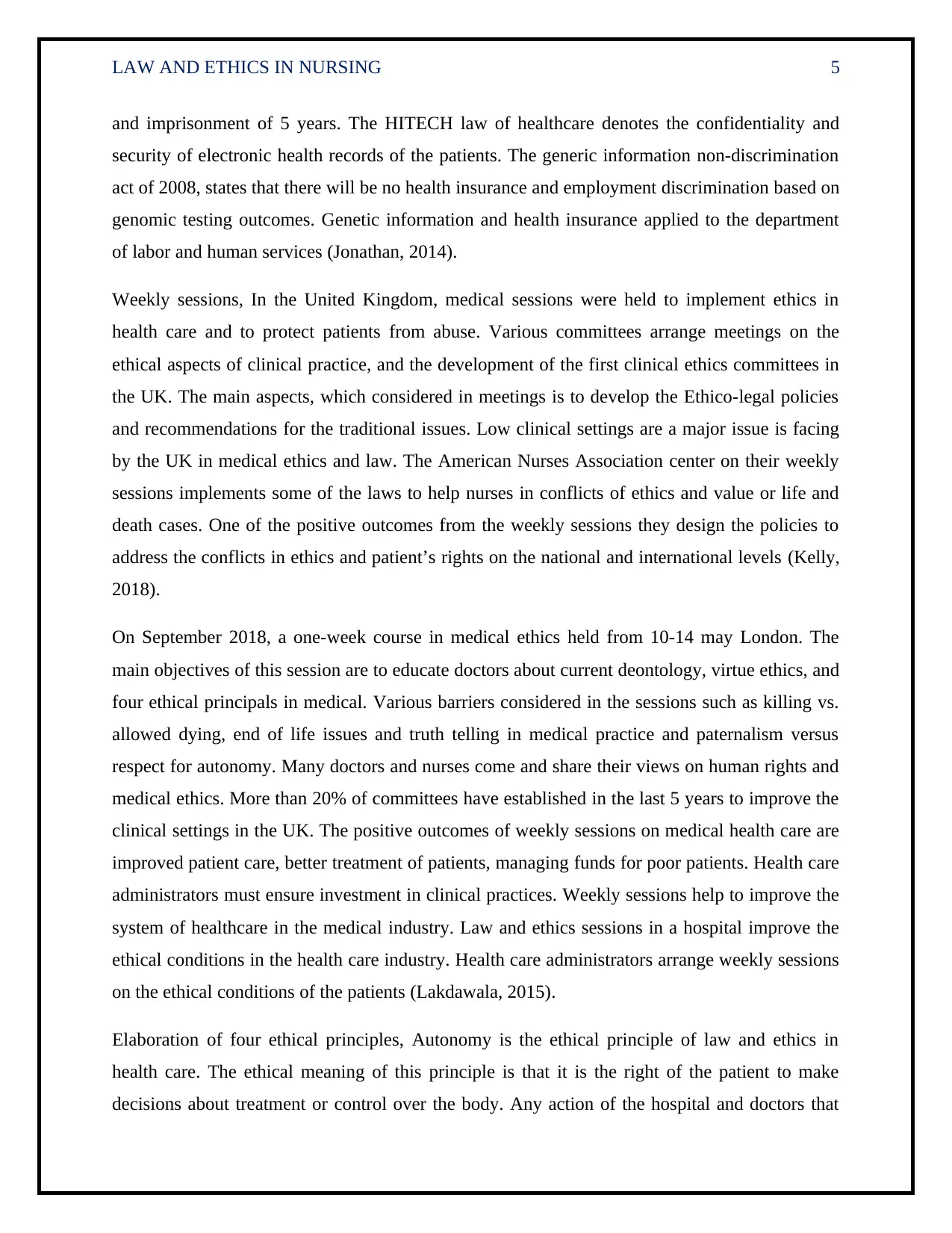
LAW AND ETHICS IN NURSING 5
and imprisonment of 5 years. The HITECH law of healthcare denotes the confidentiality and
security of electronic health records of the patients. The generic information non-discrimination
act of 2008, states that there will be no health insurance and employment discrimination based on
genomic testing outcomes. Genetic information and health insurance applied to the department
of labor and human services (Jonathan, 2014).
Weekly sessions, In the United Kingdom, medical sessions were held to implement ethics in
health care and to protect patients from abuse. Various committees arrange meetings on the
ethical aspects of clinical practice, and the development of the first clinical ethics committees in
the UK. The main aspects, which considered in meetings is to develop the Ethico-legal policies
and recommendations for the traditional issues. Low clinical settings are a major issue is facing
by the UK in medical ethics and law. The American Nurses Association center on their weekly
sessions implements some of the laws to help nurses in conflicts of ethics and value or life and
death cases. One of the positive outcomes from the weekly sessions they design the policies to
address the conflicts in ethics and patient’s rights on the national and international levels (Kelly,
2018).
On September 2018, a one-week course in medical ethics held from 10-14 may London. The
main objectives of this session are to educate doctors about current deontology, virtue ethics, and
four ethical principals in medical. Various barriers considered in the sessions such as killing vs.
allowed dying, end of life issues and truth telling in medical practice and paternalism versus
respect for autonomy. Many doctors and nurses come and share their views on human rights and
medical ethics. More than 20% of committees have established in the last 5 years to improve the
clinical settings in the UK. The positive outcomes of weekly sessions on medical health care are
improved patient care, better treatment of patients, managing funds for poor patients. Health care
administrators must ensure investment in clinical practices. Weekly sessions help to improve the
system of healthcare in the medical industry. Law and ethics sessions in a hospital improve the
ethical conditions in the health care industry. Health care administrators arrange weekly sessions
on the ethical conditions of the patients (Lakdawala, 2015).
Elaboration of four ethical principles, Autonomy is the ethical principle of law and ethics in
health care. The ethical meaning of this principle is that it is the right of the patient to make
decisions about treatment or control over the body. Any action of the hospital and doctors that
and imprisonment of 5 years. The HITECH law of healthcare denotes the confidentiality and
security of electronic health records of the patients. The generic information non-discrimination
act of 2008, states that there will be no health insurance and employment discrimination based on
genomic testing outcomes. Genetic information and health insurance applied to the department
of labor and human services (Jonathan, 2014).
Weekly sessions, In the United Kingdom, medical sessions were held to implement ethics in
health care and to protect patients from abuse. Various committees arrange meetings on the
ethical aspects of clinical practice, and the development of the first clinical ethics committees in
the UK. The main aspects, which considered in meetings is to develop the Ethico-legal policies
and recommendations for the traditional issues. Low clinical settings are a major issue is facing
by the UK in medical ethics and law. The American Nurses Association center on their weekly
sessions implements some of the laws to help nurses in conflicts of ethics and value or life and
death cases. One of the positive outcomes from the weekly sessions they design the policies to
address the conflicts in ethics and patient’s rights on the national and international levels (Kelly,
2018).
On September 2018, a one-week course in medical ethics held from 10-14 may London. The
main objectives of this session are to educate doctors about current deontology, virtue ethics, and
four ethical principals in medical. Various barriers considered in the sessions such as killing vs.
allowed dying, end of life issues and truth telling in medical practice and paternalism versus
respect for autonomy. Many doctors and nurses come and share their views on human rights and
medical ethics. More than 20% of committees have established in the last 5 years to improve the
clinical settings in the UK. The positive outcomes of weekly sessions on medical health care are
improved patient care, better treatment of patients, managing funds for poor patients. Health care
administrators must ensure investment in clinical practices. Weekly sessions help to improve the
system of healthcare in the medical industry. Law and ethics sessions in a hospital improve the
ethical conditions in the health care industry. Health care administrators arrange weekly sessions
on the ethical conditions of the patients (Lakdawala, 2015).
Elaboration of four ethical principles, Autonomy is the ethical principle of law and ethics in
health care. The ethical meaning of this principle is that it is the right of the patient to make
decisions about treatment or control over the body. Any action of the hospital and doctors that
⊘ This is a preview!⊘
Do you want full access?
Subscribe today to unlock all pages.

Trusted by 1+ million students worldwide
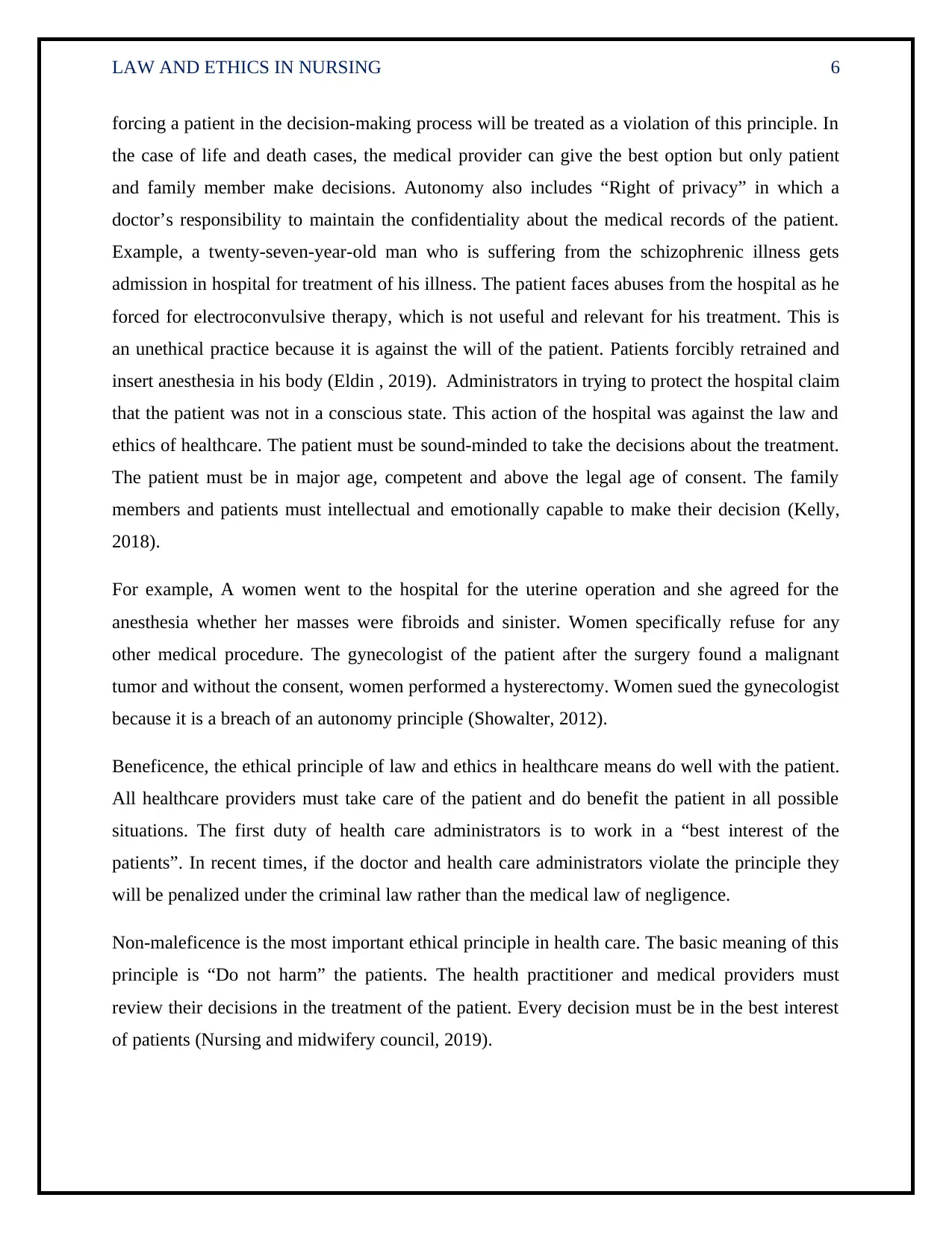
LAW AND ETHICS IN NURSING 6
forcing a patient in the decision-making process will be treated as a violation of this principle. In
the case of life and death cases, the medical provider can give the best option but only patient
and family member make decisions. Autonomy also includes “Right of privacy” in which a
doctor’s responsibility to maintain the confidentiality about the medical records of the patient.
Example, a twenty-seven-year-old man who is suffering from the schizophrenic illness gets
admission in hospital for treatment of his illness. The patient faces abuses from the hospital as he
forced for electroconvulsive therapy, which is not useful and relevant for his treatment. This is
an unethical practice because it is against the will of the patient. Patients forcibly retrained and
insert anesthesia in his body (Eldin , 2019). Administrators in trying to protect the hospital claim
that the patient was not in a conscious state. This action of the hospital was against the law and
ethics of healthcare. The patient must be sound-minded to take the decisions about the treatment.
The patient must be in major age, competent and above the legal age of consent. The family
members and patients must intellectual and emotionally capable to make their decision (Kelly,
2018).
For example, A women went to the hospital for the uterine operation and she agreed for the
anesthesia whether her masses were fibroids and sinister. Women specifically refuse for any
other medical procedure. The gynecologist of the patient after the surgery found a malignant
tumor and without the consent, women performed a hysterectomy. Women sued the gynecologist
because it is a breach of an autonomy principle (Showalter, 2012).
Beneficence, the ethical principle of law and ethics in healthcare means do well with the patient.
All healthcare providers must take care of the patient and do benefit the patient in all possible
situations. The first duty of health care administrators is to work in a “best interest of the
patients”. In recent times, if the doctor and health care administrators violate the principle they
will be penalized under the criminal law rather than the medical law of negligence.
Non-maleficence is the most important ethical principle in health care. The basic meaning of this
principle is “Do not harm” the patients. The health practitioner and medical providers must
review their decisions in the treatment of the patient. Every decision must be in the best interest
of patients (Nursing and midwifery council, 2019).
forcing a patient in the decision-making process will be treated as a violation of this principle. In
the case of life and death cases, the medical provider can give the best option but only patient
and family member make decisions. Autonomy also includes “Right of privacy” in which a
doctor’s responsibility to maintain the confidentiality about the medical records of the patient.
Example, a twenty-seven-year-old man who is suffering from the schizophrenic illness gets
admission in hospital for treatment of his illness. The patient faces abuses from the hospital as he
forced for electroconvulsive therapy, which is not useful and relevant for his treatment. This is
an unethical practice because it is against the will of the patient. Patients forcibly retrained and
insert anesthesia in his body (Eldin , 2019). Administrators in trying to protect the hospital claim
that the patient was not in a conscious state. This action of the hospital was against the law and
ethics of healthcare. The patient must be sound-minded to take the decisions about the treatment.
The patient must be in major age, competent and above the legal age of consent. The family
members and patients must intellectual and emotionally capable to make their decision (Kelly,
2018).
For example, A women went to the hospital for the uterine operation and she agreed for the
anesthesia whether her masses were fibroids and sinister. Women specifically refuse for any
other medical procedure. The gynecologist of the patient after the surgery found a malignant
tumor and without the consent, women performed a hysterectomy. Women sued the gynecologist
because it is a breach of an autonomy principle (Showalter, 2012).
Beneficence, the ethical principle of law and ethics in healthcare means do well with the patient.
All healthcare providers must take care of the patient and do benefit the patient in all possible
situations. The first duty of health care administrators is to work in a “best interest of the
patients”. In recent times, if the doctor and health care administrators violate the principle they
will be penalized under the criminal law rather than the medical law of negligence.
Non-maleficence is the most important ethical principle in health care. The basic meaning of this
principle is “Do not harm” the patients. The health practitioner and medical providers must
review their decisions in the treatment of the patient. Every decision must be in the best interest
of patients (Nursing and midwifery council, 2019).
Paraphrase This Document
Need a fresh take? Get an instant paraphrase of this document with our AI Paraphraser
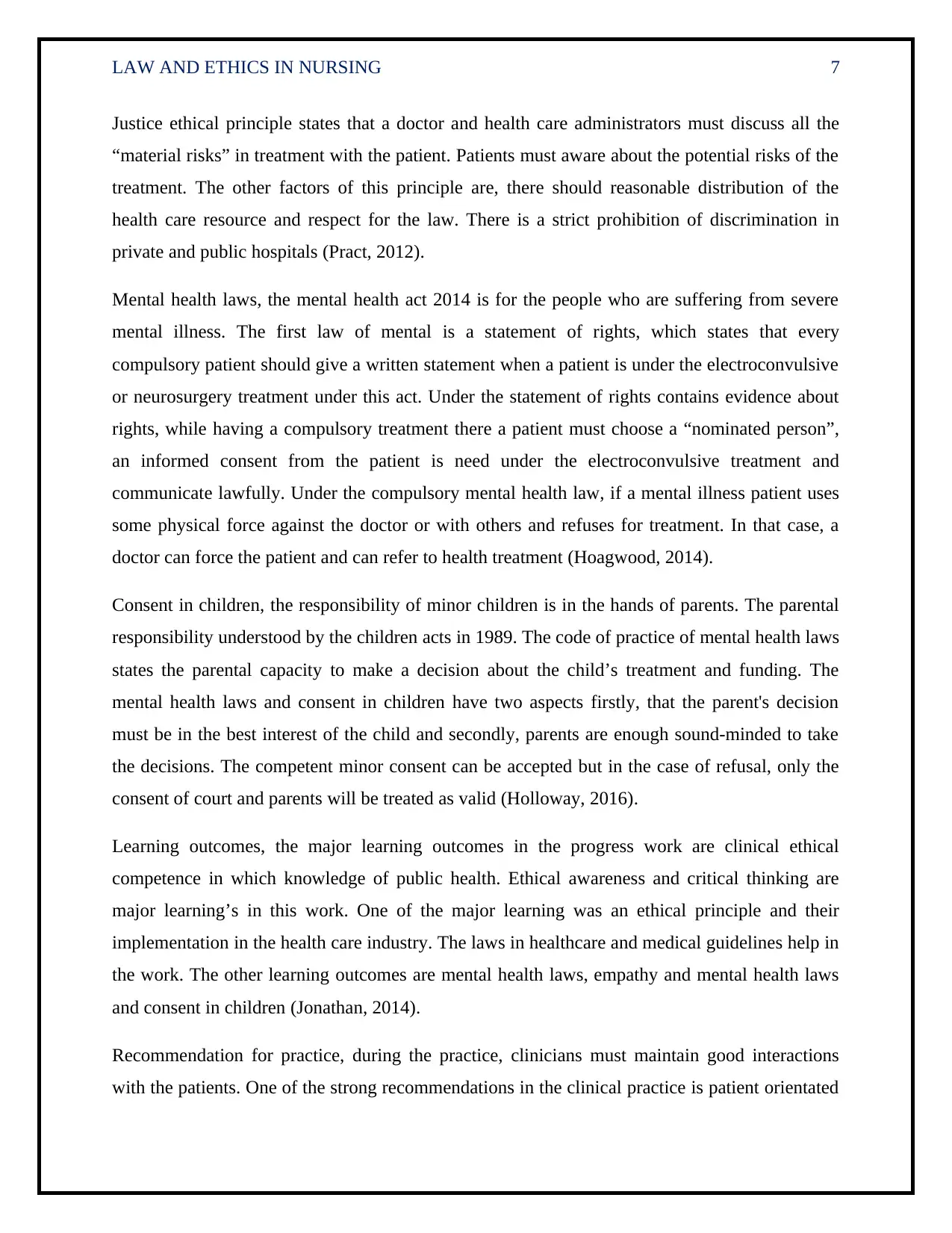
LAW AND ETHICS IN NURSING 7
Justice ethical principle states that a doctor and health care administrators must discuss all the
“material risks” in treatment with the patient. Patients must aware about the potential risks of the
treatment. The other factors of this principle are, there should reasonable distribution of the
health care resource and respect for the law. There is a strict prohibition of discrimination in
private and public hospitals (Pract, 2012).
Mental health laws, the mental health act 2014 is for the people who are suffering from severe
mental illness. The first law of mental is a statement of rights, which states that every
compulsory patient should give a written statement when a patient is under the electroconvulsive
or neurosurgery treatment under this act. Under the statement of rights contains evidence about
rights, while having a compulsory treatment there a patient must choose a “nominated person”,
an informed consent from the patient is need under the electroconvulsive treatment and
communicate lawfully. Under the compulsory mental health law, if a mental illness patient uses
some physical force against the doctor or with others and refuses for treatment. In that case, a
doctor can force the patient and can refer to health treatment (Hoagwood, 2014).
Consent in children, the responsibility of minor children is in the hands of parents. The parental
responsibility understood by the children acts in 1989. The code of practice of mental health laws
states the parental capacity to make a decision about the child’s treatment and funding. The
mental health laws and consent in children have two aspects firstly, that the parent's decision
must be in the best interest of the child and secondly, parents are enough sound-minded to take
the decisions. The competent minor consent can be accepted but in the case of refusal, only the
consent of court and parents will be treated as valid (Holloway, 2016).
Learning outcomes, the major learning outcomes in the progress work are clinical ethical
competence in which knowledge of public health. Ethical awareness and critical thinking are
major learning’s in this work. One of the major learning was an ethical principle and their
implementation in the health care industry. The laws in healthcare and medical guidelines help in
the work. The other learning outcomes are mental health laws, empathy and mental health laws
and consent in children (Jonathan, 2014).
Recommendation for practice, during the practice, clinicians must maintain good interactions
with the patients. One of the strong recommendations in the clinical practice is patient orientated
Justice ethical principle states that a doctor and health care administrators must discuss all the
“material risks” in treatment with the patient. Patients must aware about the potential risks of the
treatment. The other factors of this principle are, there should reasonable distribution of the
health care resource and respect for the law. There is a strict prohibition of discrimination in
private and public hospitals (Pract, 2012).
Mental health laws, the mental health act 2014 is for the people who are suffering from severe
mental illness. The first law of mental is a statement of rights, which states that every
compulsory patient should give a written statement when a patient is under the electroconvulsive
or neurosurgery treatment under this act. Under the statement of rights contains evidence about
rights, while having a compulsory treatment there a patient must choose a “nominated person”,
an informed consent from the patient is need under the electroconvulsive treatment and
communicate lawfully. Under the compulsory mental health law, if a mental illness patient uses
some physical force against the doctor or with others and refuses for treatment. In that case, a
doctor can force the patient and can refer to health treatment (Hoagwood, 2014).
Consent in children, the responsibility of minor children is in the hands of parents. The parental
responsibility understood by the children acts in 1989. The code of practice of mental health laws
states the parental capacity to make a decision about the child’s treatment and funding. The
mental health laws and consent in children have two aspects firstly, that the parent's decision
must be in the best interest of the child and secondly, parents are enough sound-minded to take
the decisions. The competent minor consent can be accepted but in the case of refusal, only the
consent of court and parents will be treated as valid (Holloway, 2016).
Learning outcomes, the major learning outcomes in the progress work are clinical ethical
competence in which knowledge of public health. Ethical awareness and critical thinking are
major learning’s in this work. One of the major learning was an ethical principle and their
implementation in the health care industry. The laws in healthcare and medical guidelines help in
the work. The other learning outcomes are mental health laws, empathy and mental health laws
and consent in children (Jonathan, 2014).
Recommendation for practice, during the practice, clinicians must maintain good interactions
with the patients. One of the strong recommendations in the clinical practice is patient orientated
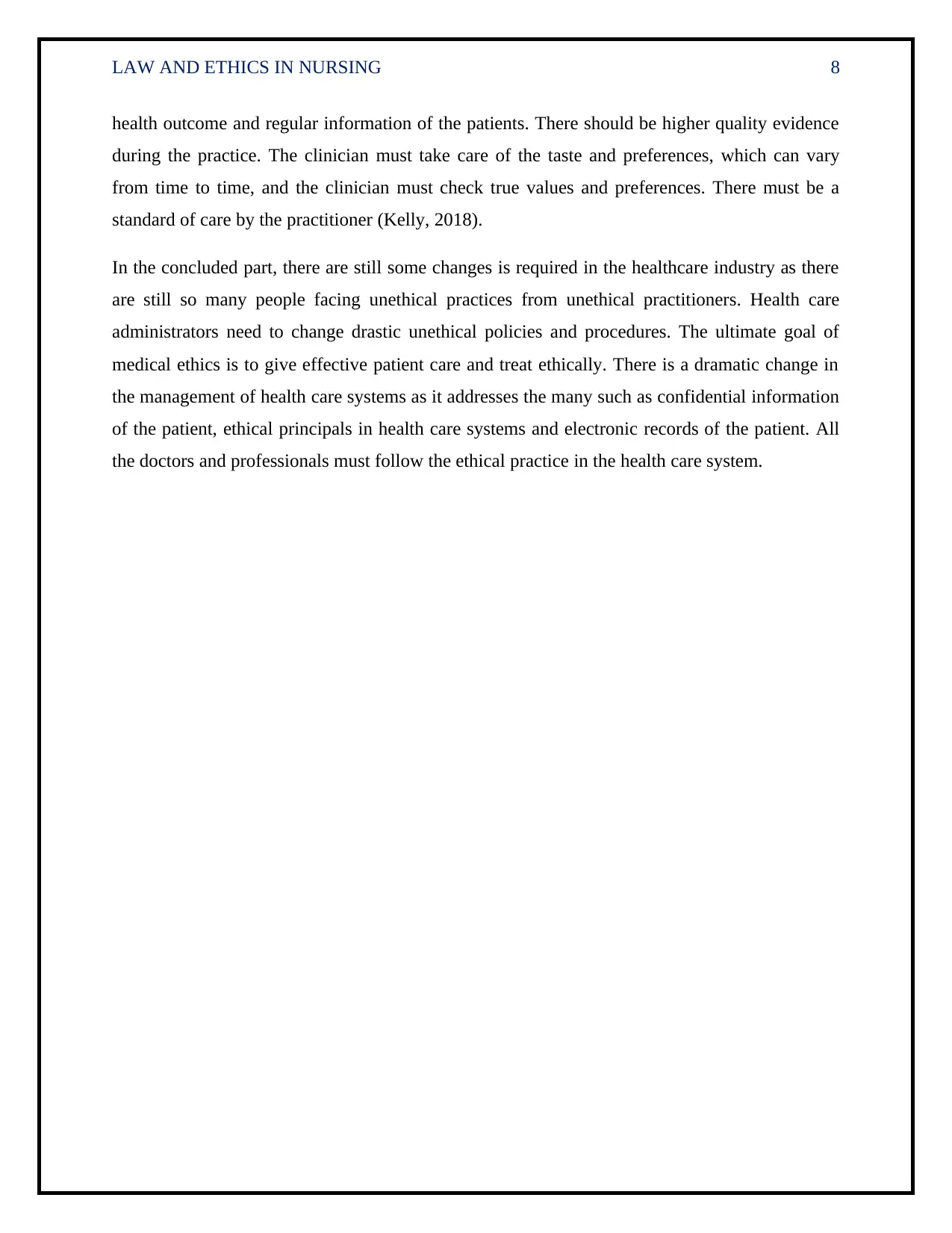
LAW AND ETHICS IN NURSING 8
health outcome and regular information of the patients. There should be higher quality evidence
during the practice. The clinician must take care of the taste and preferences, which can vary
from time to time, and the clinician must check true values and preferences. There must be a
standard of care by the practitioner (Kelly, 2018).
In the concluded part, there are still some changes is required in the healthcare industry as there
are still so many people facing unethical practices from unethical practitioners. Health care
administrators need to change drastic unethical policies and procedures. The ultimate goal of
medical ethics is to give effective patient care and treat ethically. There is a dramatic change in
the management of health care systems as it addresses the many such as confidential information
of the patient, ethical principals in health care systems and electronic records of the patient. All
the doctors and professionals must follow the ethical practice in the health care system.
health outcome and regular information of the patients. There should be higher quality evidence
during the practice. The clinician must take care of the taste and preferences, which can vary
from time to time, and the clinician must check true values and preferences. There must be a
standard of care by the practitioner (Kelly, 2018).
In the concluded part, there are still some changes is required in the healthcare industry as there
are still so many people facing unethical practices from unethical practitioners. Health care
administrators need to change drastic unethical policies and procedures. The ultimate goal of
medical ethics is to give effective patient care and treat ethically. There is a dramatic change in
the management of health care systems as it addresses the many such as confidential information
of the patient, ethical principals in health care systems and electronic records of the patient. All
the doctors and professionals must follow the ethical practice in the health care system.
⊘ This is a preview!⊘
Do you want full access?
Subscribe today to unlock all pages.

Trusted by 1+ million students worldwide
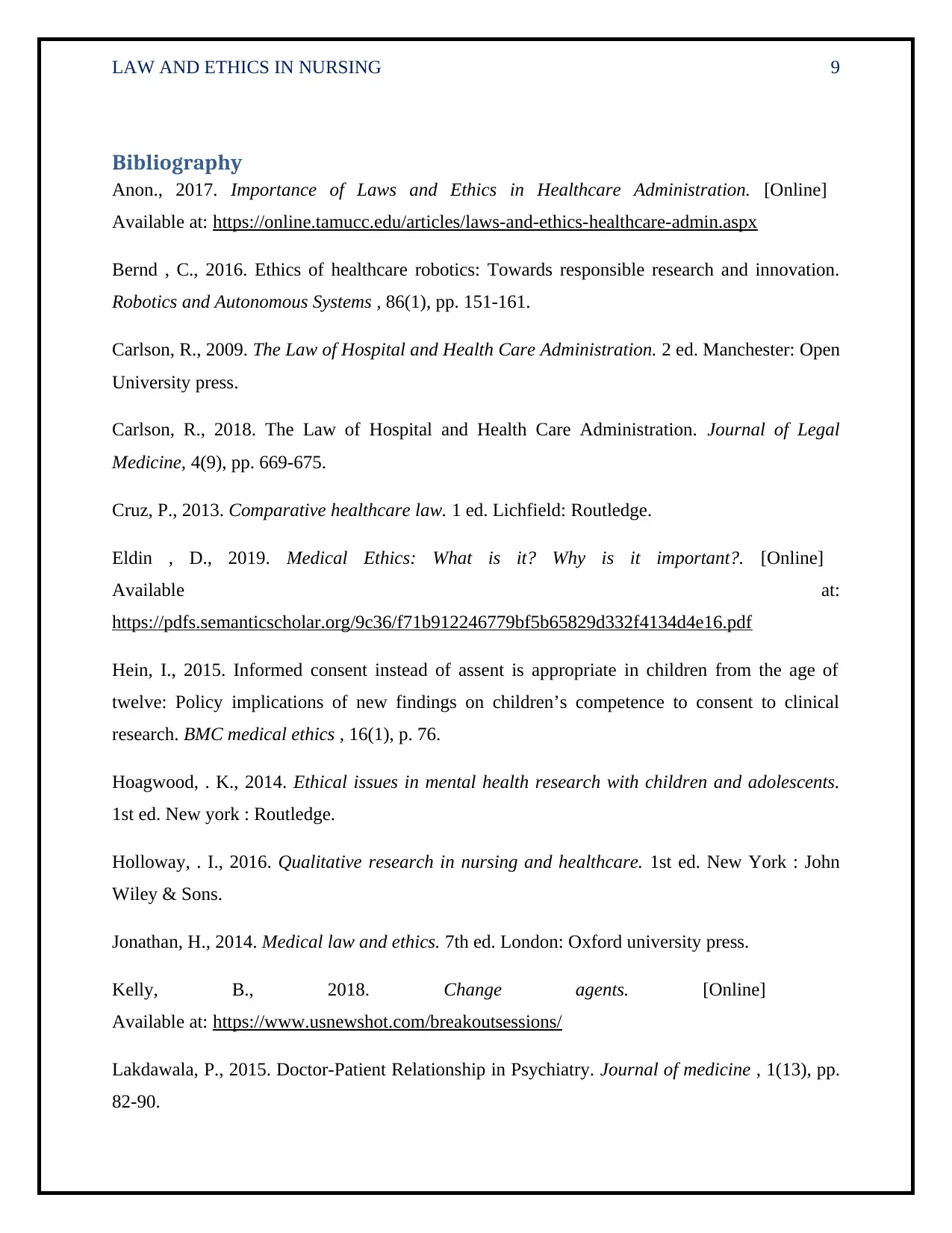
LAW AND ETHICS IN NURSING 9
Bibliography
Anon., 2017. Importance of Laws and Ethics in Healthcare Administration. [Online]
Available at: https://online.tamucc.edu/articles/laws-and-ethics-healthcare-admin.aspx
Bernd , C., 2016. Ethics of healthcare robotics: Towards responsible research and innovation.
Robotics and Autonomous Systems , 86(1), pp. 151-161.
Carlson, R., 2009. The Law of Hospital and Health Care Administration. 2 ed. Manchester: Open
University press.
Carlson, R., 2018. The Law of Hospital and Health Care Administration. Journal of Legal
Medicine, 4(9), pp. 669-675.
Cruz, P., 2013. Comparative healthcare law. 1 ed. Lichfield: Routledge.
Eldin , D., 2019. Medical Ethics: What is it? Why is it important?. [Online]
Available at:
https://pdfs.semanticscholar.org/9c36/f71b912246779bf5b65829d332f4134d4e16.pdf
Hein, I., 2015. Informed consent instead of assent is appropriate in children from the age of
twelve: Policy implications of new findings on children’s competence to consent to clinical
research. BMC medical ethics , 16(1), p. 76.
Hoagwood, . K., 2014. Ethical issues in mental health research with children and adolescents.
1st ed. New york : Routledge.
Holloway, . I., 2016. Qualitative research in nursing and healthcare. 1st ed. New York : John
Wiley & Sons.
Jonathan, H., 2014. Medical law and ethics. 7th ed. London: Oxford university press.
Kelly, B., 2018. Change agents. [Online]
Available at: https://www.usnewshot.com/breakoutsessions/
Lakdawala, P., 2015. Doctor-Patient Relationship in Psychiatry. Journal of medicine , 1(13), pp.
82-90.
Bibliography
Anon., 2017. Importance of Laws and Ethics in Healthcare Administration. [Online]
Available at: https://online.tamucc.edu/articles/laws-and-ethics-healthcare-admin.aspx
Bernd , C., 2016. Ethics of healthcare robotics: Towards responsible research and innovation.
Robotics and Autonomous Systems , 86(1), pp. 151-161.
Carlson, R., 2009. The Law of Hospital and Health Care Administration. 2 ed. Manchester: Open
University press.
Carlson, R., 2018. The Law of Hospital and Health Care Administration. Journal of Legal
Medicine, 4(9), pp. 669-675.
Cruz, P., 2013. Comparative healthcare law. 1 ed. Lichfield: Routledge.
Eldin , D., 2019. Medical Ethics: What is it? Why is it important?. [Online]
Available at:
https://pdfs.semanticscholar.org/9c36/f71b912246779bf5b65829d332f4134d4e16.pdf
Hein, I., 2015. Informed consent instead of assent is appropriate in children from the age of
twelve: Policy implications of new findings on children’s competence to consent to clinical
research. BMC medical ethics , 16(1), p. 76.
Hoagwood, . K., 2014. Ethical issues in mental health research with children and adolescents.
1st ed. New york : Routledge.
Holloway, . I., 2016. Qualitative research in nursing and healthcare. 1st ed. New York : John
Wiley & Sons.
Jonathan, H., 2014. Medical law and ethics. 7th ed. London: Oxford university press.
Kelly, B., 2018. Change agents. [Online]
Available at: https://www.usnewshot.com/breakoutsessions/
Lakdawala, P., 2015. Doctor-Patient Relationship in Psychiatry. Journal of medicine , 1(13), pp.
82-90.
Paraphrase This Document
Need a fresh take? Get an instant paraphrase of this document with our AI Paraphraser
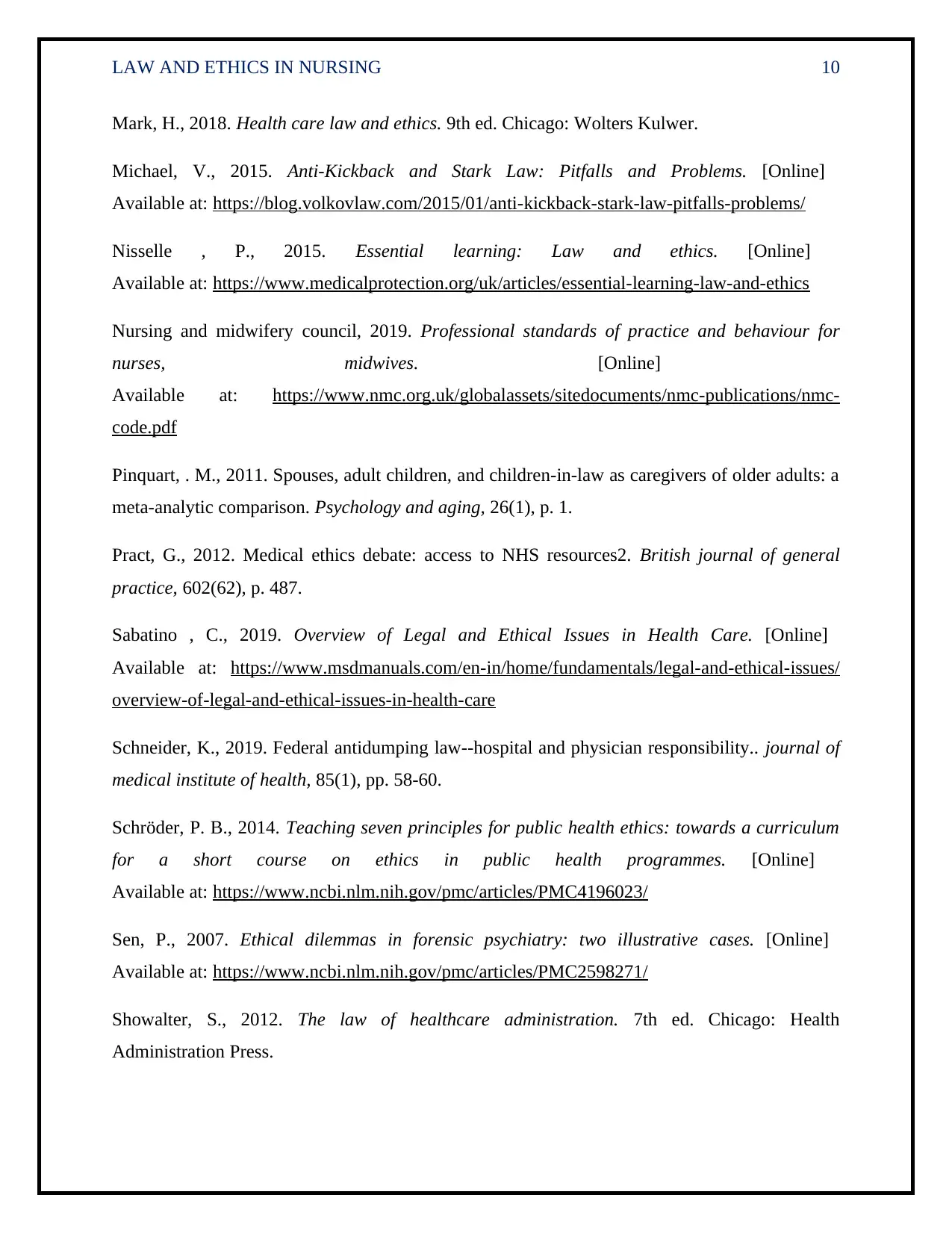
LAW AND ETHICS IN NURSING 10
Mark, H., 2018. Health care law and ethics. 9th ed. Chicago: Wolters Kulwer.
Michael, V., 2015. Anti-Kickback and Stark Law: Pitfalls and Problems. [Online]
Available at: https://blog.volkovlaw.com/2015/01/anti-kickback-stark-law-pitfalls-problems/
Nisselle , P., 2015. Essential learning: Law and ethics. [Online]
Available at: https://www.medicalprotection.org/uk/articles/essential-learning-law-and-ethics
Nursing and midwifery council, 2019. Professional standards of practice and behaviour for
nurses, midwives. [Online]
Available at: https://www.nmc.org.uk/globalassets/sitedocuments/nmc-publications/nmc-
code.pdf
Pinquart, . M., 2011. Spouses, adult children, and children-in-law as caregivers of older adults: a
meta-analytic comparison. Psychology and aging, 26(1), p. 1.
Pract, G., 2012. Medical ethics debate: access to NHS resources2. British journal of general
practice, 602(62), p. 487.
Sabatino , C., 2019. Overview of Legal and Ethical Issues in Health Care. [Online]
Available at: https://www.msdmanuals.com/en-in/home/fundamentals/legal-and-ethical-issues/
overview-of-legal-and-ethical-issues-in-health-care
Schneider, K., 2019. Federal antidumping law--hospital and physician responsibility.. journal of
medical institute of health, 85(1), pp. 58-60.
Schröder, P. B., 2014. Teaching seven principles for public health ethics: towards a curriculum
for a short course on ethics in public health programmes. [Online]
Available at: https://www.ncbi.nlm.nih.gov/pmc/articles/PMC4196023/
Sen, P., 2007. Ethical dilemmas in forensic psychiatry: two illustrative cases. [Online]
Available at: https://www.ncbi.nlm.nih.gov/pmc/articles/PMC2598271/
Showalter, S., 2012. The law of healthcare administration. 7th ed. Chicago: Health
Administration Press.
Mark, H., 2018. Health care law and ethics. 9th ed. Chicago: Wolters Kulwer.
Michael, V., 2015. Anti-Kickback and Stark Law: Pitfalls and Problems. [Online]
Available at: https://blog.volkovlaw.com/2015/01/anti-kickback-stark-law-pitfalls-problems/
Nisselle , P., 2015. Essential learning: Law and ethics. [Online]
Available at: https://www.medicalprotection.org/uk/articles/essential-learning-law-and-ethics
Nursing and midwifery council, 2019. Professional standards of practice and behaviour for
nurses, midwives. [Online]
Available at: https://www.nmc.org.uk/globalassets/sitedocuments/nmc-publications/nmc-
code.pdf
Pinquart, . M., 2011. Spouses, adult children, and children-in-law as caregivers of older adults: a
meta-analytic comparison. Psychology and aging, 26(1), p. 1.
Pract, G., 2012. Medical ethics debate: access to NHS resources2. British journal of general
practice, 602(62), p. 487.
Sabatino , C., 2019. Overview of Legal and Ethical Issues in Health Care. [Online]
Available at: https://www.msdmanuals.com/en-in/home/fundamentals/legal-and-ethical-issues/
overview-of-legal-and-ethical-issues-in-health-care
Schneider, K., 2019. Federal antidumping law--hospital and physician responsibility.. journal of
medical institute of health, 85(1), pp. 58-60.
Schröder, P. B., 2014. Teaching seven principles for public health ethics: towards a curriculum
for a short course on ethics in public health programmes. [Online]
Available at: https://www.ncbi.nlm.nih.gov/pmc/articles/PMC4196023/
Sen, P., 2007. Ethical dilemmas in forensic psychiatry: two illustrative cases. [Online]
Available at: https://www.ncbi.nlm.nih.gov/pmc/articles/PMC2598271/
Showalter, S., 2012. The law of healthcare administration. 7th ed. Chicago: Health
Administration Press.
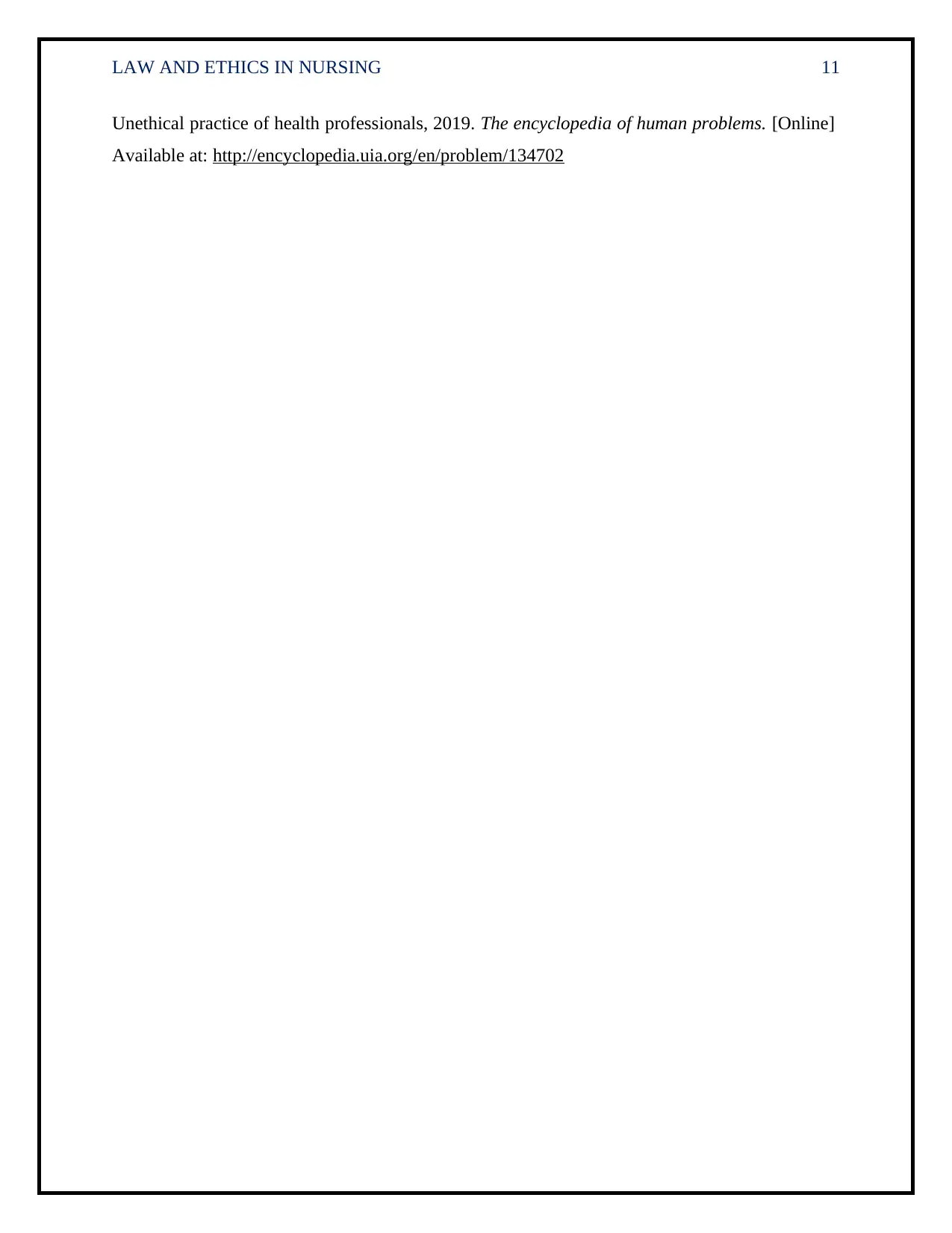
LAW AND ETHICS IN NURSING 11
Unethical practice of health professionals, 2019. The encyclopedia of human problems. [Online]
Available at: http://encyclopedia.uia.org/en/problem/134702
Unethical practice of health professionals, 2019. The encyclopedia of human problems. [Online]
Available at: http://encyclopedia.uia.org/en/problem/134702
⊘ This is a preview!⊘
Do you want full access?
Subscribe today to unlock all pages.

Trusted by 1+ million students worldwide
1 out of 12
Related Documents
Your All-in-One AI-Powered Toolkit for Academic Success.
+13062052269
info@desklib.com
Available 24*7 on WhatsApp / Email
![[object Object]](/_next/static/media/star-bottom.7253800d.svg)
Unlock your academic potential
Copyright © 2020–2026 A2Z Services. All Rights Reserved. Developed and managed by ZUCOL.





